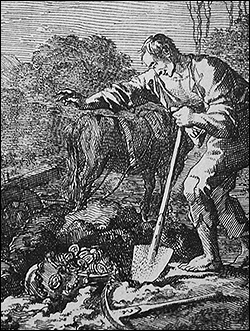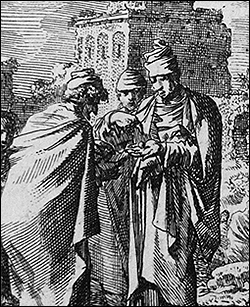
Home > Jesus > Parables of Jesus > Parables of the Hidden Treasure and the Pearl of Great Price
 The Treasure in the Field
The Treasure in the Fieldand the Pearl of Great Price
“The kingdom of heaven is like a treasure hidden in the field, which a man found and hid again; and from joy over it he goes and sells all that he has and buys that field. 45 Again, the kingdom of heaven is like a merchant seeking fine pearls, 46 and upon finding one pearl of great value, he went and sold all that he had and bought it.” — Matthew 13:44-46, NASB
These parables teach similar lessons on the infinite value of God’s kingdom. Jesus uses them to emphasize to the disciples the significance of the promise of salvation, the importance of recognizing it, and that it is worthy of whatever sacrifice is necessary to acquire it. The brief analogies are part of an extended series of parables focusing on the kingdom of heaven and comprising the third of Matthew’s five major discourses, the Parabolic Discourse.
The setting finds Jesus teaching in parables to a multitude of people at the shore of the Sea of Galilee before retiring to the nearby house with the disciples. After explaining to them the parable of the tares, the previous one given to the crowd, He teaches the hidden treasure and pearl parables.
The usage of the term ‘kingdom of heaven’ in each analogy refers to a state of true redemption in Christ. In both instances, the kingdom is represented as an object of extreme value and not readily available, emphasizing that redemption is precious and something that must be acquired.
There are a few differences between the two illustrations; the most notable perhaps being that the man in the field seems to happen upon the item of great value by chance, while the merchant actively seeks it. Sometimes, like the man in the field, or the woman who encountered Jesus at the well, people apparently stumble upon the gospel message by accident. A person may hear about Jesus from someone else, or they may hear a sermon on a radio or read a Christian book that helps to set them on the path to salvation.
The man in the field, not necessarily looking for anything, happens upon a great treasure. Knowing its value at once and overjoyed to discover it, he immediately takes action to acquire it. We can ascertain that he could not afford such a treasure outright, but by selling everything he has, he can then afford to acquire the field and subsequently gain the treasure.
Salvation likewise comes to us at an affordable price through God’s grace. Those who the Father has drawn to Christ, even if they do not realize they are being drawn, instantly recognize the value of the treasure that is redemption and eternal life. Because man falls short of the glory of God, he cannot afford this treasure outright, but he can acquire the field by turning from sin, self and the things of this world, and submitting to Christ as Lord and Savior. In and of ourselves we cannot pay the price God demands, but we can acquire His kingdom through our faith in Jesus.
 In the early first century pearls had immense value and uncovering a flawless specimen was an extremely rare occurrence. The merchant of the parable actively seeks for such a pearl, as people often seek the meaning, fulfillment and justification in their lives that ultimately God can only provide. Through grace, some are led to actively seek God, and those who seek
In the early first century pearls had immense value and uncovering a flawless specimen was an extremely rare occurrence. The merchant of the parable actively seeks for such a pearl, as people often seek the meaning, fulfillment and justification in their lives that ultimately God can only provide. Through grace, some are led to actively seek God, and those who seek
will find Him.
Both the merchant and the man in the field exchange everything they have to acquire the valuable item. Others may think the sacrifice they make is foolish, but salvation is an endless treasure—both men understand what they are getting in return. They gladly give up everything, much like the disciples who immediately dropped what they were doing to follow Jesus. Obedience and self-denial are basic to Christian discipleship, but God will make up for the things the believer gives up, innumerable times over. Sadly, with most people the treasure of the gospel is not considered as valuable as the treasures of this world, and they are unwilling to make the sacrifice.
In both cases the item is not readily visible or available. Many miss the promise of heaven. While a man’s eyes must be open to see truth, it is through no special deeds that the subjects in these parables create their opportunity; it comes upon them providentially. Such is God’s grace, which allows the kingdom to become apparent and accessible to some—but requires the commitment of a believing heart to truly possess.
Nothing is equal to the value of Christ and His kingdom. It is priceless, infinite and eternal. But like the treasure in the field or the incomparable pearl, it is not easily found. Shallow searches for life’s meaning and lukewarm spirituality will not uncover it. We have to enter through the narrow gate and walk the narrow path. When grace calls us to Christ, we must recognize the value of that gift and act decisively, denying self and forsaking empty, earthly pursuits to claim His promise.
Images:
Luyken, Jan (1649-1712); Parable of the Hidden Treasure (detail); Medhurst, Phillip (attribution)
Luyken, Jan (1649-1712); Parable of the Pearl of Great Price (detail); Medhurst, Phillip (attribution)
Scripture Alone • Faith Alone • Grace Alone • Christ Alone • To the Glory of God Alone
Most scripture quotations taken from the New American Standard Bible® (NASB)